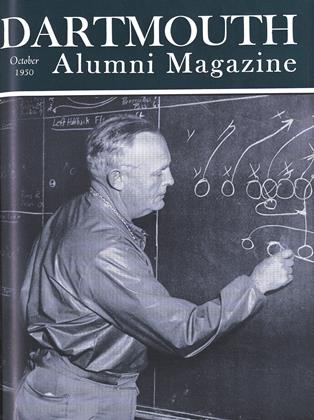FANNY S. LEWIN, for many years Assistant Registrar of the College, died suddenly at her home in Hanover on July 18. Born in Hanover in 1885, she had spent her entire life here. She attended the Hanover schools, Kimball Union Academy, and graduated from Wellesley College in 1909.
After assisting her father in his business for a few years Fanny Lewin became an assistant in the Registrar's Office in 1917 and began an association with the College which was to last for 29 years. When she entered the employ of the College there were only 12 women on the college payroll; when she retired in 1946 there were 172 women on the administrative staff.
During her long years of residence in Hanover she became one of the best loved members of the community. With an unfailing sense of humor and a deep sense of civic responsibility, an omniverous reader always abreast of the times, an enthusiastic traveler, she gave to her town the best in the New England tradition.
No woman associated with the College has known intimately so many generations of undergraduates and faculty. The following tribute from Prof. Wm. Stuart Messer is one of many paid to her by members of the faculty:
"Of all the highly capable women who keep the wheels of the College running silently and smoothly, Fanny Lewin, as Assistant Registrar, was of necessity the one most widely known to the teaching staff. The one administrative office with which no instructor can avoid dealings is the office of the Registrar. Here the views of the teacher and the taught have to be reconciled with fairness to both. Here the faculty, always an individualistic group and traditionally vague about executive details, has to be informed of necessary regulations and disciplined to meet inflexible deadlines. In contacts concerning these matters and myriads of others Fanny Lewin showed herself kind and gracious, and above all efficient. Her term of service coincided with a period of vast expansion of the College and the rapid oscillation of the curriculum—a situation abounding in opportunities for errors and resultant annoyances in an office where errors cannot be permitted and where annoyances reduce efficiency. Her exact knowledge of the content of the countless courses and of the machinery of the curriculum caught and corrected the errors. Her gentleness and courtesy smoothed down the annoyances; and yet no instructor left her presence unaware that a repetition of the mistake or the irritation would not be fair play; she had a genius for getting results. Toward newcomers to the faculty she was particularly helpful and considerate, and those who joined the staff in such numbers some 25 years ago will never be able to express adequately their appreciation of her patience, her understanding, and her skill."
FANNY S. LEWIN
 View Full Issue
View Full Issue
More From This Issue
-
 Sports
SportsFINIS
October 1950 By Bernard G. Sykes '51 -
 Article
ArticleMan on the Job . . . for Thirty Years
October 1950 By JOHN HURD '21 -
 Class Notes
Class Notes1918
October 1950 By ERNEST H. EARLEY, DONALD L. BARR, DAVID L. GARRATT -
 Class Notes
Class Notes1923
October 1950 By TRUMAN T. METZEL, COLIN C. STEWART 3RD, JULIUS A. RIPPEL -
 Class Notes
Class Notes1905
October 1950 By GEORGE W. PUTNAM, GILBERT H. FALL -
 Article
ArticleTHERE'S METHOD Behind the Fall Madness
October 1950 By ROGER K. WOLBARST '43







